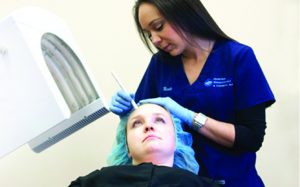 What is PDT?
What is PDT?
Photodynamic therapy (PDT) is a medical treatment for actinic keratoses (pre-cancers) and sun-damaged skin. Photodynamic therapy combines the use of a topical photosensitizing agent which is applied to the skin and a light source which activates the medicine to kill the abnormal cells. PDT is also referred to as blu light therapy.
What is PDT used for?
PDT is used to treat actinic keratosis (AK). An actinic keratosis is a crusty or scaly growth that occurs in sun exposed areas such as the face, chest, arms and hands. Actinic keratoses are often red or pink in color and feel rough compared to the normal skin. In very early stages, AKs are so small that they may be easier felt than seen. Oftentimes, patients have many more invisible actinic keratoses than what is seen on the surface of the skin.
Actinic keratoses are a result of DNA damage to the skin caused by exposure to the sun’s ultraviolet (UV) radiation. Actinic keratoses are considered precancerous because if left untreated they have the potential to become more abnormal and develop into a squamous cell skin cancer. PDT is especially useful for widespread lesions on the face and scalp. Although PDT is a medical treatment, it may also provide cosmetic benefits, typically leaving the skin more even-toned and with no scarring or pigmentary changes.
What is the procedure like?
PDT is performed in a dermatologist’s office and consists of three basic steps. First, the skin is cleansed and a topical photosensitizing substance is applied to the area of skin to be treated. Second, there is an incubation period which may range from 30 minutes to 3 hours or even overnight during which time the photosensitizer is absorbed by areas of the skin that have become abnormal (both what is visible and not yet visible). Finally, the area to be treated is exposed to a light source that activates the photosensitizer and kills the abnormal cells. This final stage lasts approximately 16 minutes and feels very warm, like you are getting a sun burn.
Does the PDT treatment hurt?
PDT is very well tolerated by patients. Most patients experience some burning (as if sitting in the sun) during the treatment which we help to alleviate by the use of fans and cold air.
What restrictions do I have?
The treated area is extremely light sensitive for the first 48 hours following the procedure. It is recommended to avoid sun exposure during this time. Hats, scarves, and sunscreen with zinc oxide are also recommended.
What can I expect after the procedure?
After the procedure, the treated skin will be pink or red and may peel for the first few days (may feel like a sun burn). This typically resolves in about a week. Less commonly, more intense reactions can involve itching, swelling and pronounced crusting and discomfort. This may be more likely to occur if the area being treated has a large number of pre-cancers or if the area treated is inadvertently exposed to sun during the first 48 hour after treatment People who have very intense reactions to the treatment often have excellent results.
What can help to
optimize/maintain my results?
Sun protection is important for all patients with actinic keratosis (regardless of how it is treated) to reduce the risk of developing new lesions. ISDIN Eryfotona is a novel sunscreen from Barcelona which contains 11% zinc oxide and a Nobel Prize winning DNA repair enzyme, photolyase. Photolyase helps to boost the skin’s natural recovery process, reversing DNA damage caused UV rays. Eryfotona is scientifically proven to induce improvement in patients with actinic keratosis and to help maintain results of PDT treatments. Eryfotona can also be successfully used for patients who do not undergo PDT.
If you have any further questions about PDT or Eryfotona, please contact our office at (561) 498-4407 or feinsteindermatology.com
Dermatologist in Delray Beach, FL,
6140 West Atlantic Avenue, Delray Beach, FL 33484
1 (888) 357-DERM
(561) 498-4407
feinsteindermatology.com
Check Also
Trusted Homecare Agency: Serving Veterans with Free Supplemental Home Healthcare
When it comes to healthcare, veterans deserve the best care possible. For veterans seeking in-home …
 South Florida Health and Wellness Magazine Health and Wellness Articles
South Florida Health and Wellness Magazine Health and Wellness Articles




